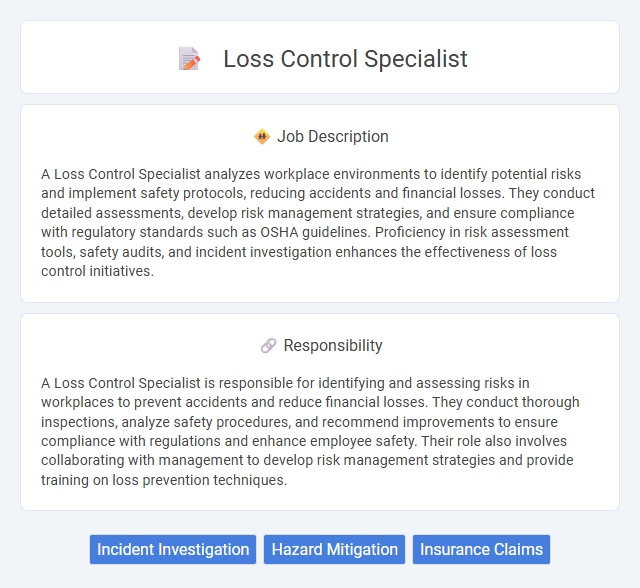
A Loss Control Specialist analyzes workplace environments to identify potential risks and implement safety protocols, reducing accidents and financial losses. They conduct detailed assessments, develop risk management strategies, and ensure compliance with regulatory standards such as OSHA guidelines. Proficiency in risk assessment tools, safety audits, and incident investigation enhances the effectiveness of loss control initiatives.
Individuals with strong analytical skills and a detail-oriented mindset are likely well-suited for a Loss Control Specialist role, as it involves assessing risks and implementing safety measures. Those comfortable with frequent communication and fieldwork may find the job's demands manageable and rewarding. Candidates lacking attention to detail or who prefer routine office tasks might not find this position as fitting.
Qualification
Loss Control Specialists typically require a bachelor's degree in occupational safety, engineering, or risk management, accompanied by certifications such as Certified Safety Professional (CSP) or Associate in Risk Management (ARM). Strong analytical skills and experience with OSHA regulations, safety audits, and risk assessment tools are essential for evaluating workplace hazards and implementing prevention strategies. Proficiency in data analysis software and excellent communication abilities enhance their effectiveness in coordinating with management and employees to reduce claims and improve safety compliance.
Responsibility
A Loss Control Specialist is responsible for identifying and assessing risks in workplaces to prevent accidents and reduce financial losses. They conduct thorough inspections, analyze safety procedures, and recommend improvements to ensure compliance with regulations and enhance employee safety. Their role also involves collaborating with management to develop risk management strategies and provide training on loss prevention techniques.
Benefit
A Loss Control Specialist likely enhances workplace safety by identifying potential hazards and implementing preventive measures, potentially reducing accident rates. This role probably contributes to lowering insurance costs and minimizing financial losses for companies through effective risk management. Employers may also benefit from improved regulatory compliance and a stronger safety culture due to the specialist's expertise.
Challenge
A Loss Control Specialist likely faces the challenge of accurately assessing diverse risk factors across various business environments to prevent potential losses. Managing evolving safety regulations and ensuring compliance while maintaining operational efficiency could require continuous learning and adaptability. Effectively communicating risk mitigation strategies to stakeholders may also prove complex, demanding strong interpersonal skills and problem-solving abilities.
Career Advancement
Loss Control Specialists play a critical role in risk management by identifying and mitigating potential hazards to reduce workplace accidents and insurance claims. Career advancement opportunities include progressing to senior loss control consultant roles, risk management analyst positions, or leadership roles within insurance companies and corporate risk departments. Gaining industry certifications such as Certified Safety Professional (CSP) or Associate in Risk Management (ARM) can significantly enhance career growth prospects.
Key Terms
Incident Investigation
A Loss Control Specialist conducts thorough incident investigations to identify root causes and prevent future accidents. They analyze workplace hazards, gather evidence, interview witnesses, and compile detailed reports to enhance safety protocols. Effective incident investigation supports risk reduction and compliance with occupational health and safety regulations.
Hazard Mitigation
Loss Control Specialists identify workplace hazards through thorough inspections and risk assessments to develop effective hazard mitigation strategies. They implement safety protocols, provide employee training, and recommend engineering controls to reduce potential losses from accidents and environmental risks. Proactive hazard mitigation directly decreases workplace injuries, claims, and operational downtime, supporting overall organizational risk management goals.
Insurance Claims
A Loss Control Specialist in insurance claims evaluates risk factors and implements preventative measures to reduce losses and improve safety for clients. They conduct thorough inspections, analyze claim histories, and collaborate with underwriters to develop effective risk management strategies. Expertise in regulatory compliance and industry standards enhances their ability to minimize claim frequency and severity, protecting both insurers and policyholders.
 kuljobs.com
kuljobs.com